A brief essay on Dystopian Worlds - credits to @kruznik
This is the english translation of an article written by Kruznik —with his permission, of course!— hence, this posts' SBD rewards will be rightfully shared with him. You can read the original article (in Spanish) here.
This literary and film genre, brings a wake up call to the spectator, preventing a social collapse somewhere in the future. Generally crude, and with a disappointing ending, it aims to create a strong impact in the reader, to encourage them to reflect.
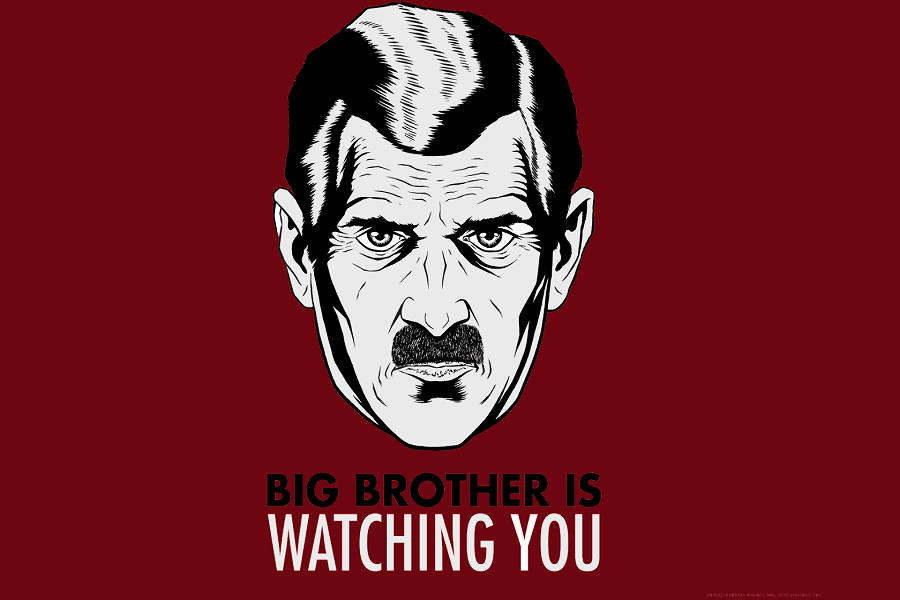
Source
“One does not establish a dictatorship in order to safeguard a revolution; one makes a revolution in order to establish a dictatorship.” 1984, George Orwell.
I’ve always thought that mankind is astonishing, but also has a dark side, and a bunch of its genius and talent is being used inappropriately. With a bit of time to stop and research human history, we’ll find the (in)famous nuclear bombs dropped on Hiroshima’s and Nagasaki’s population, and that’s just a little example of man’s own destructive potential.
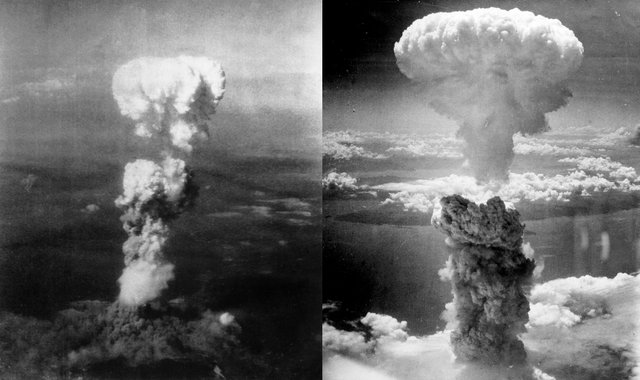
Source
“Nuclear bombs dropped on Hiroshima and Nagasaki on August 6th and 9th, 1945”
Technology leaps forward at breakneck speeds and that’s a process we can not stop, however we should make a better use of it even though we’re not guarded against powerful parties willfully coercing any good intentions. A great example of this is the attempt made by certain countries to restrict internet use, hence increasing their power and dominion over the populace, with the excuse of protecting and watching over their citizens.
These are just hidden intentions to violate a human right: Free Speech, having an opinion and debating and many of us aren’t willing to let that right disappear, even if others can express a viewpoint we might not be in agreement with, just like the famous quote from Evelyn Beatrice Hall (usually and wrongly attributed to Voltaire, by the way) "I disapprove of what you say, but I will defend to the death your right to say it". Once this right is removed, the bases for a productive society start falling apart and its fruit starts to rot. It is in this kind of environment where many writers exposed their ideas, to show the path that mankind had been taking was no good.
When George Orwell wrote 1984, it only had been 4 years since WWII had broken out, and it’s with this vision among 2 extremist parties (fascism and communism) that the author developed this amazing masterpiece of a novel, which brought out the “Big Brother” catchphrase, synonym of repression, curfew and authoritarianism, which sadly are lived in real life, in countries such as North Korea, Cuba and Venezuela. A bit stronger in some than the rest, but nevertheless: there is no doubt about the influence that this book has had in many writers, but were it more widely known, as an educational reference, I’m sure it would be an eye-opening experience for many.

Source
62.400 repetitions make a statement true. Aldous Huxley in A happy World
On the other hand, we have Aldous Huxley’s masterpiece “A Happy world”, where the story revolves around a “happy” environment, kept in that state by genetic techniques such as eugenesia so that every human being is specifically born to fulfill a particular job, hence removing the possibility of choosing one’s own destiny. None of the citizens in A Happy world seem to realize that they’re being used, nor that they live in a mind-prison of sorts since war and poverty have been vanquished at the cost of also vanquishing the very feature that makes each of us human.
One of the things that struck me about this novel was that society is split into fixed classes or castes, in which each citizen will inexorably remain until the end of their lives, from the gammas who are considered almost non-human, people with low intelligence created for manual labor, up to the alphas at the top of the ladder.
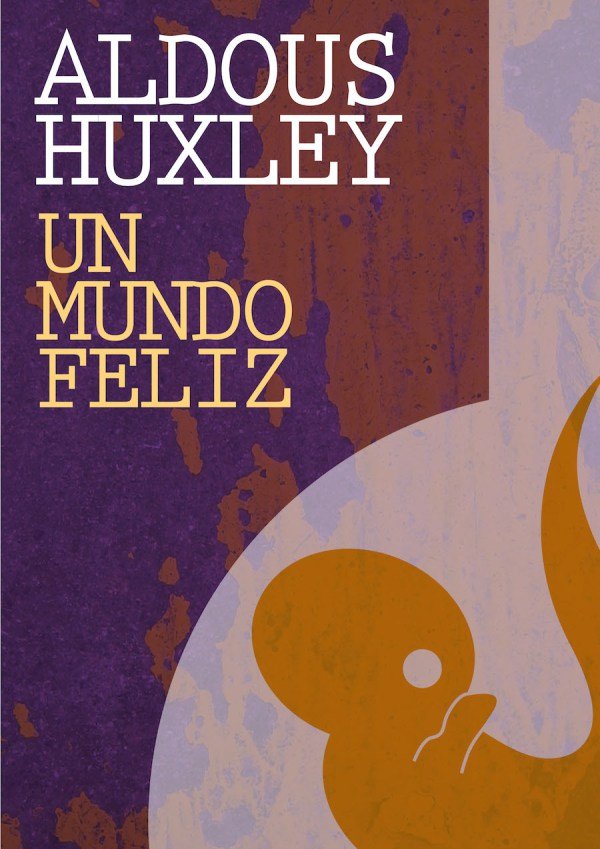
Source
In Fahrenheit 451 from Ray Bradbury, books are burnt, a premise that might look like madness at first glance, but it has its reasons. The world imagined by Bradbury is a society in cultural decadence, a looming apathy which makes people fall into an intellectual stagnation, promoting that “ignorance is bliss”, hence by not thinking, one wouldn’t suffer. In Bradbury’s world, the State decides to burn every single book, along with the houses where they are found; however the protagonist, a social misfit, decides not to accept this fact.
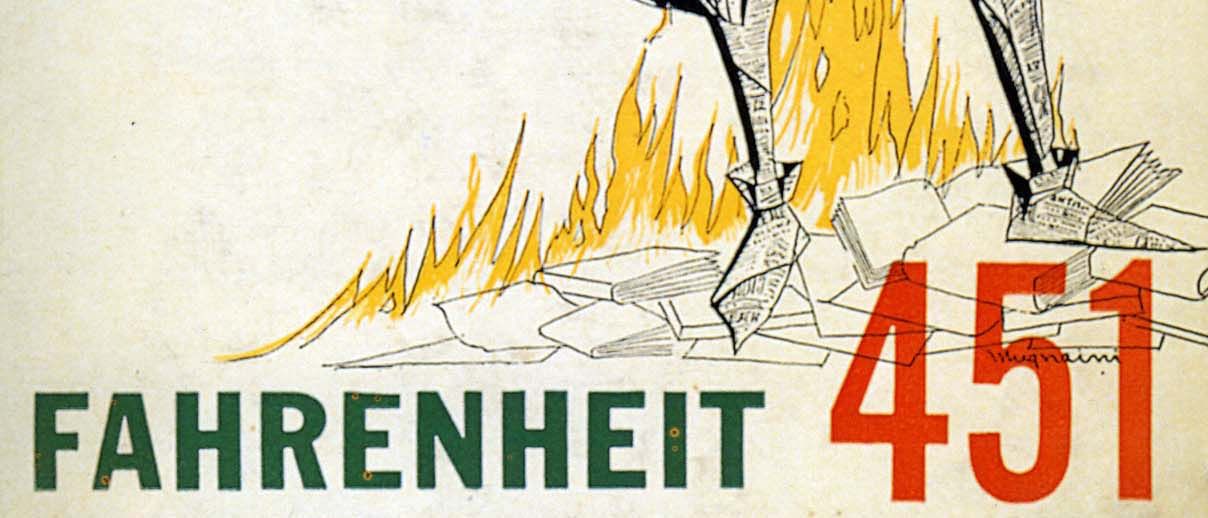
Source
“A book is a loaded gun in the house next door … ¿Who knows what could be the target of a man who has read a lot?” Ray Bradbury’s Fahrenheit 451
In modern society, many times culture is not well perceived, news in mass media and tv rarely inform us about scientific or really artistic events because these news are promptly buried under piles of fresh press which is apparently interesting, yet not that important, in my humble opinion.
These are the three key pieces in dystopian literature, however there are a bunch of other books whose ideas grew from these ones. Without the need for scientific research, José Saramango, in his book “Ensayo sobre la ceguera”, takes us to a world where people lose their sight and the consequences of this are nefarious. Blind people are isolated, meanwhile that isolation sentences them to live in deplorable conditions where the most base human instincts start to surface.
These hostile worlds have also been quite present in the film industry, with movies such as Stanley Kubrick's "A Clockwork Orange"; we can watch a chaotic and decadent world, filled with violence to the brim, but in an elegant way.
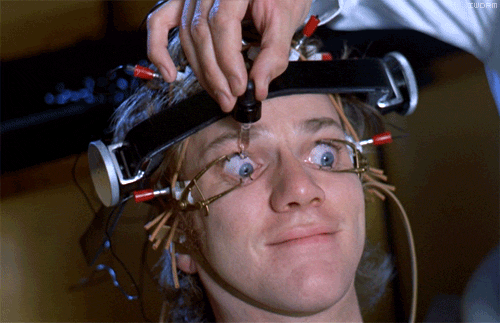
Source
Neil Blomkamp's Elysium, immerses us in a futurist Earth where classism is latent; the lower class has to live in miserable conditions while the higher class enjoys luxuries, protection and tech which allows them to live in a "proper" world.
As we can appreciate, most of these titles are a but a reflection of our present world, an inner voice which calls injustice out, and foresees a future disaster if mankind follows its current path. Many argued that George Orwell was exaggerating by the time he wrote 1984, but the truth of the matter is that we're currently living under similar circumstances and I consider this to be something we shouldn't just allow to happen. It's true that some avarice and reckless ambition will always exist, but within a thinking (and not just consumerist) society, I believe this could eventually change, and turn things out for the best.
Reading or watching a dystopia awakens our consciousness in a way that could very well seem shocking. Nevertheless, they depict a possible way in which the future could be: cruel, hostile and merciless, where the will of one is the law for everyone else, where morals and opinions become lost in oblivion and what scares me the most, free thinking would be but a forgotten dream. Let's not allow the constant bombardment of manipulative information push us into a void of ignorance, let us reflect and have more consciousness about our surroundings, and that way we'll be able to build a really global and limitless world.
Hello, please follow the rules of the group Steemit for Resteem ↕ and you will be resteemed by the most active members in the group.
You have to resteem a post from the group before you post yours there.
Here is : HOW TO RESTEEM ON STEEMIT ?
Congratulations @charles-razor! You received a personal award!
Click here to view your Board
Congratulations @charles-razor! You received a personal award!
You can view your badges on your Steem Board and compare to others on the Steem Ranking
Vote for @Steemitboard as a witness to get one more award and increased upvotes!